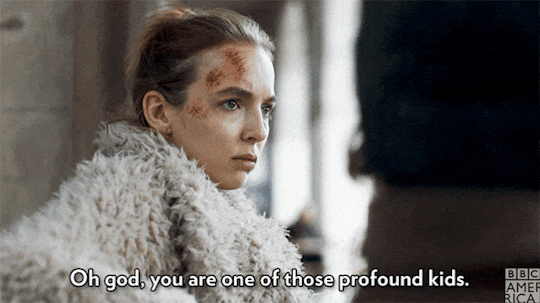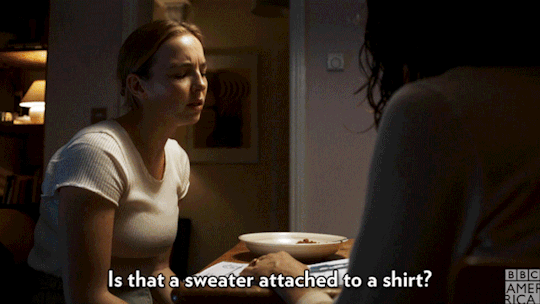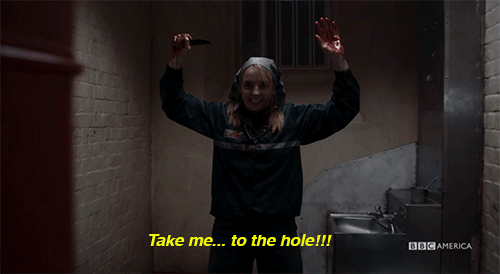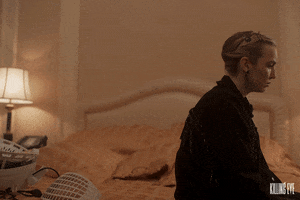#i originally wrote a whole another perspective from Villanelle
Explore tagged Tumblr posts
Text
Nowhere To Run

Synopsis: All games require a victor, and with your last heaving breath, the game has declared its winner.
Characters: Villanelle x Reader
Warnings: Angst, mentions of blood, knives, wounds and guns throughout the story
A/N: It's been a long time since I last watched Killing Eve, so it might not be entirely accurate. (I've completely forgotten if Villanelle left The Twelve or not?)
Anyway, Nowhere To Run by Stegosaurus Rex popped up on my playlist today, it reminded me of her immediately.
All grammatical mistakes are mine as per usual.
--------------------------------------------------------------------
A droplet of blood drips from your forehead but it falls unnoticed beneath the pool of crimson you’re lying in. Your hand finds its way to the wound as it settles on your abdomen. Apply pressure, apply pressure, your mind races with each passing moment and you feel your lifeline slipping away through the dampening cloth between your fingers.
You avert your eyes from the ceiling to meet hers, locking into a fierce gaze despite the excruciating state. Villanelle kneels and the smile she offers as she looks down upon your writhing body is daunting, to say the least. You watch as she clasps your blood-smeared hand, moving it away from your fresh wound and a metallic scent fills your nostrils.
“Does it hurt?” She asks you, her other hand reaching up to stroke your cheek gently. For a second, you could’ve sworn there’s a glint of guilt in her eyes but the moment is short-lived when a searing heat pulsates throughout your right thigh, staining the nearby walls and furniture in carmine as your eyes squeeze shut, your fists clenching with little to no energy.
You deserve it, that’s what Villanelle reassures herself. She’s given everything you could’ve imagined: money, trust, devotion, and yet you still left her for The Twelve, left her alone to rot just like the rest. She really thought you were special, but you’re just like them, like Konstantin who chose his family over her.
“Y-yes,” you answer faintly as she kisses your temple, wiping the tears off your blood-coated skin, the distinction between your body temperatures is vast due to the rapid blood loss. Pulling the knife out of your thigh, Villanelle chuckles as you squirm beneath her, she wants you to remember the consequences of your treasonous actions, feel the same ache and time you’ve cost her.
“Good.” Looking up, the barrel of her gun rests on your forehead and her finger lingers on the trigger, contemplating.
“I’m sorry.”
“I know.” In the end, there was nowhere to run, nowhere she couldn’t find you. The two of you were playing a dangerous game, a deadly one. And with your last heaving breath, the game has declared its winner.
You've lost, and she's won.
#villanelle x reader#killing eve x reader#villanelle imagine#villanelle imagines#oksana astakhova x reader#this doesn't make any sense but bear with me#i originally wrote a whole another perspective from Villanelle#one where she regrets her choices after the bang :/#but it didn't deliver well so i rewrote it
169 notes
·
View notes
Text
Perspective: Can redeeming Villanelle make her character less iconic?
Have you ever heard of the Codex Gigas? Also known as ‘The Devil’s bible’, it is the largest illuminated manuscript in the world according to Wikipedia. It is told that a monk made a pact with the Devil himself and feverishly wrote the entire book in one night! As an acknowledgment to his partner he drew his monstrous figure in one of the pages. Said page looks different from the others, as if touched by some malignant magic. Today we know the reason for it: the page suffered the most deterioration for being the most exposed. For centuries people could not get enough of this character: The Devil. Indeed, we have codified ways to save ourselves from the metaphorical Devil – ourselves. We invented sins and crimes to tame something deeply primal within us. Freud called it id, the origin of all that which makes us tick: impulses, instinct, drives, libido. It reckons only two things: pleasure and satisfaction. If we could strip ourselves from all inhibition there would be impulse and sensation. It would be brutal ecstasy. But what would be of the world if all 7 billion of us would uncompromisingly seek to satisfy our impulses? Hell, so we don’t.

But through art we can glimpse at what this liberation would feel like. Some sort of existential voyeurism. Aristotle would call it catharsis, but what does he know? This is how some of the most remarkable characters were born, they mesmerize us by being their id – unapologetically, terrifyingly, charmingly – like the Devil himself. Characters like Hannibal Lecter, The Joker, Alex DeLarge; they are larger than life, unbind, amoral and extremely bright (and all male). Like Hannibal brilliantly put it in Silence of the Lambs: “Nothing happened to me, officer Starling, I happened” or like the perverted childlike Alex explain in A Clockwork Orange: “What I do I do because I like to do”. As simple as that. Pure satisfaction of impulse because they feel like it. When we, uneased by what they represent, want explanations or justifications, The Joker toys with us, always giving us a different version of his tragic background, as if he knew we want to give him an excuse and, in good joker fashion, he makes a huge joke out of it. They take it very seriously to explain to us what went wrong with them, because it doesn’t really matter.

While the id makes us organic, whole creatures, many attributes of it have been culturally dissociated from womanhood. The violent, self-preserving and egoistic impulses were replaced with nurturing, self-sacrifice and compassion – not surprisingly the only impulse afforded to women is motherhood (or sexual desire for the satisfaction of another). Therefore, women cannot fully materialize their humanity. These raging impulses feel alien to womanhood, something imposed on to them by circumstance so severe that it warps the nature of the female itself. Aggressive women are sad and broken, or vengeful, or mad, or sexualized – these are the portrayals we have been conditioned to expect from fiction. When compared to their male counterparts, even mild violence in a female character almost immediately requires an explanation: how someone betrayed them, or abused them, or they were conditioned into it. Rage and aggression are never theirs to own, it is always extrinsically sourced.
On a superficial level, the character of Villanelle doesn’t seem so unique. Immediately one could think of Nikita in La femme Nikita, who was a drug junkie teen, rescued and transformed into a cold-blooded femme-fatale assassin by the shadowy government group “The Centre” after they faked her death to break her from prison (Uncannily similar?). Or the movie Anna by the same writer, where a Russian girl accepts a KGB offer to be trained into an assassin in order to escape her abusive homelife. Or Marvel’s black widow who is also a Russian spy, apparently brainwashed by USSR to become an assassin. Other female assassins include The bride in Kill Bill who set off into a revenge killing spree after being brutally assaulted and left for dead, and other movies I vaguely remember about abused women becoming assassins to seek revenge, or shallow sexy female assassins with no purpose for existing other than being the sexy female assassin. However, all these characters were made into assassins by external factors. Villanelle is set apart from the typical femme-fatale assassin trope by owning her own joy of killing, by the rejection of the broken female narrative and the rejection of the objectifying male gaze. In order to unmistakably ground these traits alienated from women – violence, disregard, cruelty, indifference, sadism, risk-taking – in her nature, the character was written as a primary psychopath. Being an assassin fits her natural talents, not the other way around

Villanelle could occupy a very special place among a roster of remarkable fictional characters like the ones mentioned earlier. She is the female embodiment of absolute, remorseless indulgence and rage, representing the unashamed satisfaction of women’s impulses, for her own enjoyment alone, with style and wit – A truly magnetic character and fresh perspective. In psychopathic Villanelle, women are allowed to reclaim these violent impulses, which is oddly empowering and humanizing. Give us that. Brilliantly, the cathartic element is mirrored by Eve herself. Eve too sees her unfulfilled and alienated impulses incarnated in Villanelle, which in turn sparks Eve’s exploration of her own identity. Ultimately Villanelle’s seduction to embrace impulse despite its danger is at the core of their electric attraction and conflict.
Thus, by retconning Villanelle in Season 3, the character no longer represents the provoking embodiment of female drive, managing to become an elevated female assassin trope, at best. The challenging take on womanhood, instead plays into all of the expectations. Villanelle is no longer a female true to her nature that gets a kick from being an assassin; but a troubled girl, tortured into becoming a killing machine by a past of abuse. A broken woman who rejects the violence instilled into her once she finds healing. Interestingly, it is not that she merely chooses not to kill but she is unable to carry on the act, signifying the deeper alienation of the violent impulse from her own self – the same impulse that once made her so iconic. This lack of impetus to kill is but a symptom of the decreased character’s libido in general: fewer shopping sprees, less savory eating, less unpretentious playfulness, less color, less eroticism, less aggression, less danger. Unfortunately, it also means the weakening of her dynamic with Eve. Villanelle is being tamed, and its well… not her best take.

We, the audience, perceive this lack of vitality oozing into the entire show, but once you shift what Villanelle represents this is inevitable. Villanelle becomes mundane, and it brings the nostalgia of the force of nature she once was. It leaves a similar taste as the brutal transformation of Alex from despicable nihilistic hedonist into a model citizen in A clockwork orange: a conflicted perverted sadness at the loss of Alex’s authenticity despite him turning into a “better” human being – ingeniously, his redemption was to gain his despicable impulses back.
The initial character design of Villanelle was something unique and authentic. However, In the process of redeeming her, she might become a new iteration of a trope explored several times that simply reflect the current space of female characters and lack conceptual originality. Yet, there is still room for the recuperation of Villanelle’s transgressive power: a subversive redemption. By incorporating the impulsive indulgence and violence back into the character, Villanelle’s arc can be taken somewhere new, complex and truly special. A remarkable character we can’t get enough of – like the Devil herself.

#killingeveperspectives#killing eve#killingeve#killing eve retcon#killing eve analysis#killing eve review#villanelle#villanelle analysis
41 notes
·
View notes